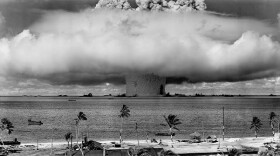A federal appeals court last Friday blocked a company’s long simmering plan to ship highly radioactive nuclear waste to West Texas, a ruling that further complicates the country’s search for a long-term home for its growing stockpile of waste from nuclear power plants.
The company, Interim Storage Partners, has for years pursued the idea of using an existing site in Andrews County, on the Texas border with New Mexico, as a long-term home for much of the nation’s “high-level” nuclear waste.
In 2021, the Nuclear Regulatory Commission granted the company a license for the plan, despite a move by state lawmakers that same year to ban the proposal. The State of Texas responded with a lawsuit arguing that the NRC didn’t have authority to issue the license.
On Friday, a three-judge panel of the U.S. Fifth Circuit Court of Appeals agreed with the state, ruling that federal law does not give the commission the power to issue such licenses.
“The Atomic Energy Act doesn’t authorize the Commission to license a private, away-from-reactor storage facility for spent nuclear fuel,” U.S. Circuit Judge James Ho wrote for the majority. “And issuing such a license contradicts Congressional policy expressed in the Nuclear Waste Policy Act.”
“This is an important ruling for Texas against a federal agency attempting to overstep its authority,” said Paige Willey, a spokesperson for Texas Attorney General Ken Paxton.
Interim Storage Partners did not respond to a request for comment on the ruling. The NRC did not respond when asked if it would seek to appeal the ruling to the U.S. Supreme Court.
The ruling is a notable win for opponents of the West Texas nuclear waste plan, who have argued for years that shipping the highly radioactive material from nuclear power plants to a remote corner of West Texas would endanger communities across the U.S.

In Texas, an unlikely alliance of environmental groups and oil interests spearheaded opposition to the nuke waste plan and the company behind it. Republicans also joined the fold, saying the plan would jeopardize the state’s oil and gas industry and threaten the nation’s energy security.
“Today our voices are finally heard,” Republican State Rep. Tom Craddick, who represents part of the Permian Basin oil patch in West Texas, said in a statement after Friday’s ruling. “Texas is not the country’s dumping ground and I will always fight to defend the Permian Basin.”
One of the plaintiffs in the Texas-led lawsuit was Fasken Land and Minerals, a locally prominent oil and gas company that has lobbied for years against the nuclear waste plan.
Monica Perales, an attorney for the company and an associated trade group called Permian Basin Land and Royalty Owners, said even a minor mishap with shipments of radioactive waste through West Texas could disrupt the nation’s energy supply.
“It doesn’t have to be a major incident,” she said. “Any hiccup, and you interfere with our production and the transportation of oil and gas, it’s going to have a domino effect across the nation.”
It’s unclear what impact Friday’s ruling will have on a separate company’s plans for a nuclear waste site just across the West Texas border in New Mexico.
Earlier this year, the NRC approved a high-level nuclear waste storage license to Holtec International. The company, essentially a rival of Interim Storage Partners, has pursued its own proposal for a long-term nuclear waste storage site in Lea County, New Mexico. But as in Texas, the Holtec plan has faced growing opposition and has been blocked by state lawmakers.
Holtec declined to comment on the court ruling.
Texas’ nuclear waste saga is in some ways a repeat of what happened with a site called Yucca Mountain in Nevada. The site was promoted for decades as a possible home for the nation’s nuclear waste, but the plan fizzled out after years of opposition and political pushback.
Those within the nuclear energy industry argue the government is obligated to find a solution to the waste problem.
In a statement, the trade group Nuclear Energy Institute said it disagreed with the Fifth Circuit’s ruling.
“Congress gave the NRC very broad authority that encompasses licensing at-reactor and away-from-reactor used fuel storage,” Ellen Ginsberg, the group’s senior vice president and general counsel, said. “If the Fifth Circuit’s decision is allowed to stand, we will further delay progress toward a solution.”








